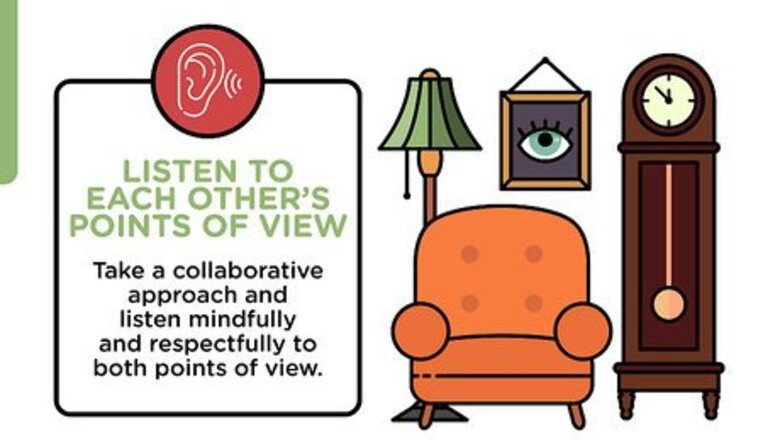
views
Working Towards a Resolution
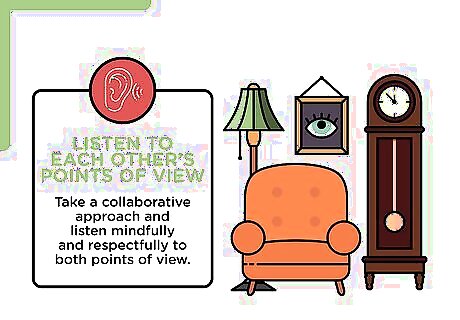
Listen to each other's points of view. Rather than think of the argument as a you vs the other person, take a collaborative approach and listen mindfully and respectfully to both points of view. Being collaborative means working side by side to reach a resolution, rather than pit your points of view against each other. Seeking a deeper understanding of the other person's point of view will allow you both to move forward towards a resolution.
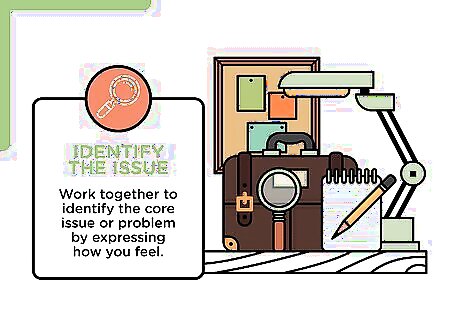
Identify the issue. Typically, arguments occur when one person's wants or needs are not being met. So, work together to identify the core issue or problem by expressing how you feel. When you communicate the issue, be conscious of the language you use. For example, focus on using transitions in your sentence with a phrase like “at the same time”, instead of “but”. As well, try to express how you feel, as opposed to what you think the other person feels or thinks. The issue could be identified in a simple statement like: “When you use your smartphone at dinner, it bothers me,” or “It makes me uncomfortable when you talk about my mother like that.”

Take responsibility for your actions. Validating the other person's point of view by acknowledge the error of your actions or words is an important step towards forgiveness and resolution. This could be as simple as an apology and an acknowledgement that you made a mistake or are cultivating a bad habit like using your smartphone at the dinner table. Of course, this is a two way conversation, so the other person should also be willing to take responsibility for their actions and words, and apologize for responding angrily. Reader Poll: We asked 460 wikiHow readers about the most effective ways to resolve an argument, and 83% agreed that apologizing and taking accountability for your actions are key. [Take Poll]

Discuss the issue in a constructive and collaborative way. Now that you have identified the root cause of the argument, and have both taken responsibility for your actions or words, have a discussion about possible solutions to the issue. Ask each other questions like: “What must change or happen to meet your needs?” “What can we both do to not argue about this issue again?” For example, if you struggle with your friend's smartphone at the table during dinner, suggest limiting their smartphone use to before or after dinner. Or if you take offense to the way your partner talks about your mother, discuss the issues your partner has with your mother and how you can both work to minimize these issues together.

Create a “win-win” solution for both of you. Finding a “win-win” solution does not necessarily mean compromising, as sometimes a compromise can act as a quick-fix solution that doesn't last long. A “win-win” solution is when the needs on both sides of the argument are met. So if you struggle with your friend's smartphone use, agree to times before and after dinner where they are free to use their phones. Or if you have an issue with the way your partner talks about your mother, be open to discussing why your partner talks about your mother in a certain way, and consider a solution where your partner spends less time around your mother.

Shake on it, or make up. Showing that you forgive the other person through a physical action like shaking hands, hugging, or even make up sex will reinforce your willingness to move past the argument. It will also be a good reminder for any future disagreements, as you have both acknowledged your mutual respect and love for each other. Now that you've had a healthy discussion about your relationship, it's important to reward yourselves by enjoying each other's company, so go out for dinner, watch a movie together, or have another drink. In fact, science has shown that the old adage, “don't go to bed angry” proves true, so don't settle for holding a grudge or withholding your forgiveness, and instead go to bed or leave the discussion with a strong sense of reconciliation and resolution.
Discussing Your Emotions
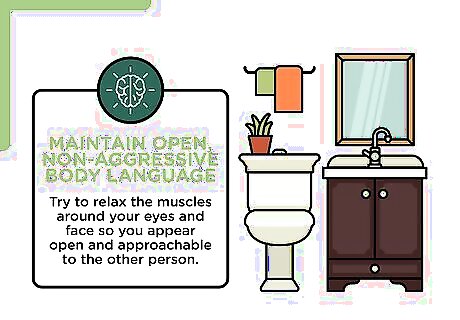
Maintain open, non-aggressive body language. Relax your arms and legs so your limbs are limp and not tense. Try to relax the muscles around your eyes and face so you appear open and approachable to the other person. Avoid folding your arms over your chest or rolling your eyes. You want to appear open and engaged in the discussion, as opposed to cold or defensive.
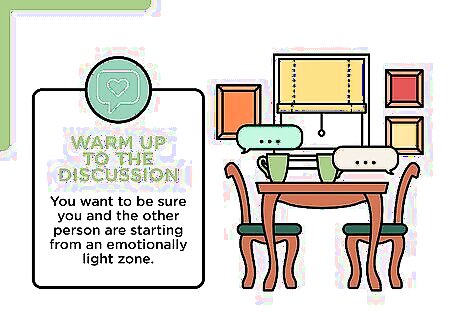
Warm up to the discussion. Before you try to address the issue again, test the waters by talking about a nice moment you shared together earlier that day or a few days ago, or by making a peace offering with flowers or a card. You want to be sure you and the other person are starting from an emotionally light zone before venturing into the possibly more sensitive discussion about the argument.
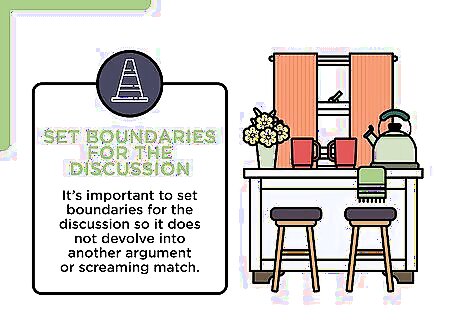
Set boundaries for the discussion. Once you feel comfortable returning to the scene of the argument and working on a resolution, it's important to set boundaries for the discussion so it does not devolve into another argument or screaming match. Talk with the other person about avoiding swear words or name calling. As well, discuss the importance of not cutting each other off or interrupting each other. Stress the importance of respecting each other's point of view and being mindful of each other's feelings.
Analyzing Your Emotions
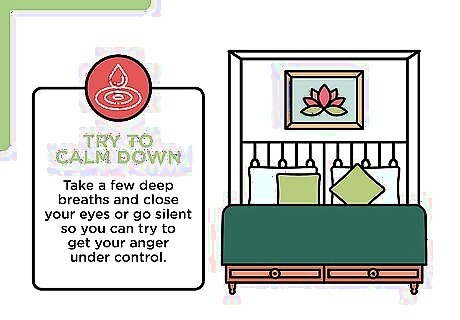
Try to calm down. Take a few deep breaths and close your eyes or go silent so you can try to get your anger under control. Depending on how intense the argument is and how good you are at tempering your emotions in the moment, you may feel comfortable with resuming the discussion with the other person once you take a moment to try to calm down. Another approach may be to physically step away from the argument. Let the other person know you need a timeout or time away from the argument. Once you inform them you need to take a break, go into another room, excuse yourself from the table, or head out for a long walk or run. An argument is a time of heightened emotions, so physically distancing yourself from the situation can help to put your emotions into perspective. But it's essential you let the other person know you need a time away to sort out your thoughts and emotions, and never simply storm off or walk out of the room with no explanation or promise to return to resolve the argument.

Work on ending the argument earlier, rather than later. If your anger can be charted on a scale, try to pause and calm down when your anger level is at a three or four, rather than a high 10. By the time you reach level four or higher on the anger scale, you may be so filled with rage or self indignation towards the other person you may end up saying more damaging and hurtful things to the other person. This will then likely make it more difficult to work on a mindful resolution of the argument later. If an argument does reach a high 10 on the anger scale, and things are said that you or the other person will likely regret saying later, it's important to think about how this conflict will affect your relationship with this person. For partners who don't fight often, forgiveness may be the best way to resolve the argument, especially if it has escalated to a very angry or hurtful level. Keep in mind that the idea of “fighting fair” is mostly an oxymoron in a relationship, like “jumbo shrimp” or “military intelligence”. A fight usually begins on uneven or unfair ground for both parties, so even if it does escalate to very angry levels, it's important to work towards forgiveness rather than holding a grudge or being passive aggressive about your anger.

Process your emotions. While this may sound like a tall order, especially if you're experiencing intense anger or anxiety due to the argument, it's important to return to your partner with a clear sense of what triggered the argument and how you are going to try to resolve the argument. You can write down your feelings in a journal or diary. You can also try to listen to music to calm down and focus on processing your emotions. Another option might be talking aloud to yourself in an empty room or space.

Talk to someone about your emotions. If you are having a hard time processing your emotions on your own, you may want to reach out to someone you trust and discuss your feelings with them before you return back to your partner. For example, a good friend, another family member, or professional help like a counselor, a therapist, or a spiritual guide.
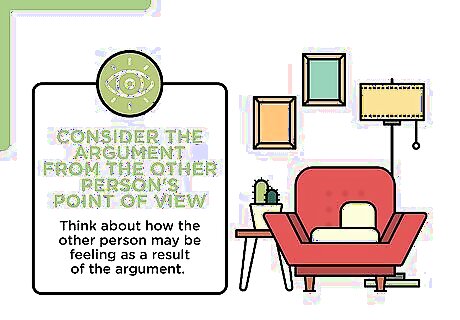
Consider the argument from the other person's point of view. Often, when we are caught up in an argument, we focus on how we are feeling, as opposed to how the other person is feeling. The “need to be right” defense usually occurs because we are in fact afraid of being wrong or feel threatened by the other person's point of view. Think about how the other person may be feeling as a result of the argument. Consider if anything you said or did towards them could have acted as a trigger for their anger. Place yourself on the receiving end of your anger and think about how angry or upset you would be if you were in their position.



















Comments
0 comment